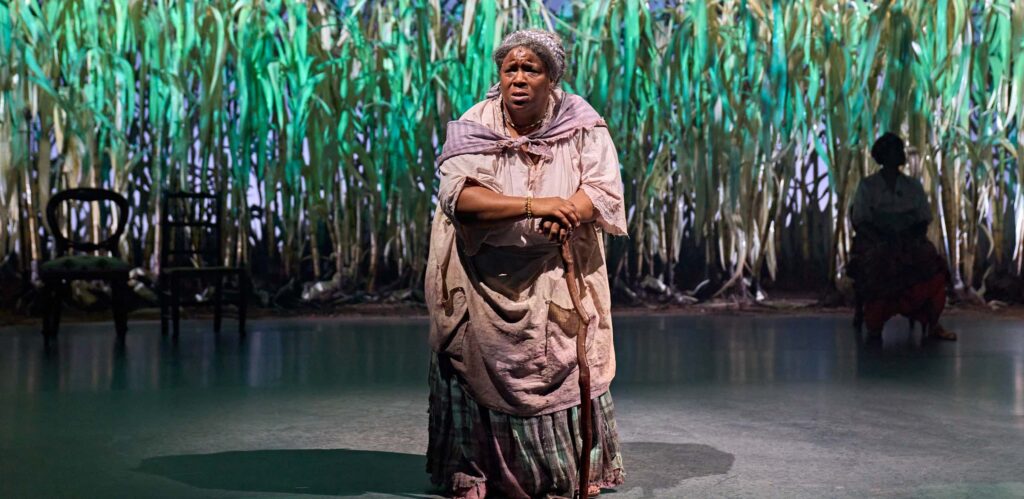
The Long Song
Chichester Festival Theatre
1 – 23 October 2021
A new adaptation by Suhayla El-Bushra
Directed by Charlotte Gwinner
Based on the novel by Andrea Levy
In our present climate of increasing awareness of some of history’s big players having had egregious links with slavery; Black Lives Matter and prominent racial issues being raised, this play is an important piece. However, it is not overtly political, not at all. It is a story. Above all it is woven from the fabric of Andrea Levy’s own story.
This incredible adaptation by Suhayla El-Bushra is a testament of the prizewinning author’s own heritage, and is based on her acclaimed novel written in 2010. Although ‘The Long Song’ is a work of fiction, its roots are firmly placed in the protracted era of Colonialism, Jamaican slavery and the struggle against the cruelty of imperialism.
Be aware that the dialogue is littered with the ’N’ word, babies described as ‘pick-nies’, and the patois throughout means concentration is required. However this is all essential for absorbing us into the culture, era and truth of those dark turbulent times.
When first seen on screen, the story was described as a tale of ‘endurance, passion and hope’. It is a story that most of us will be at the very least pretty aware of, but only via vague historical references or the odd TV production, plus of course recent events. ‘Gone With the Wind’ it certainly is not.
Chichester’s wonderful thrust stage is a gift for director Charlotte Gwinner and movement director Angela Gasparetto, where the whole cast can come and go on stage, wend their way through the 8 foot high sugar cane back set; sing, dance, fight and make love, the whole performance glued together by the commanding, if somewhat mercurial presence of old Miss July, whose story this is. She is a strong-willed, spirited woman, at the same time utterly charming. Her constantly twinkling eyes belie the struggles and horrors of her life in slavery. However, are we a little taken in by her reminiscences, coaxed out of her by her host with the aid of a plate of tender pork, and more than a little cake, so wry and mischievous is she in her telling?
The play opens with Llewella Gideon (who is the real star of the show) as the old Miss July, never off stage, always on the periphery, gliding around with the aid of her gnarled old walking staff, often passing by her younger self (brilliantly played by Tara Tijani) like a ghost from the past, watching and commenting. And asking for more cake. We are mesmerised by her narrative, her commanding yet playful nature, but how accurate are the memories she lays before us?
We are in Jamaica on the Amity sugar cane plantation around 1815, ruled by a cruel and inhumane overseer. Young Miss July, Tara Tijani, is a lady’s maid, a more privileged position, albeit still enslaved. We watch in horror at the violence directed towards pregnant female slaves, the quiet dignified responses from those slaves. Proudness and defiance mingle with amused contempt at the superficiality of their ‘owners’, having to respect them, but being unworthy of respect. The casual use of whips, sexual depravity towards these proud people who are treated literally as ‘possessions’ is sometimes difficult to take. And yet we must.
When the new overseer, Robert Goodwin, engagingly played by Leonard Buckley, arrives following the introduction of the Abolition of Slavery law, it seems like a big change is coming… and it does. Goodwin is aspirational and excited about improving the conditions on the plantation. However, nothing is that simple and human nature, as we know, takes a lot longer to adapt, and soon we see the new overseer revert to type. He struggles with his belief in equality and his ruthless ambition. Watch out for the shocks. But be assured that there is as much humour and laughter as there is outrage and dismay.
The choreography for the subsequent rioting was brilliantly executed, as were the shocking scenes to follow. The audience was at times holding its breath, such was the power of this production, followed by gasps of horror at the injustice inflicted by these imperialists. However, minutes later we were experiencing feelings of optimism and joyousness, laughing at the little asides and sheer ridiculousness of the ‘terribly British’ supercilious behaviour of these Victorian interlopers. The audience is run through a gamut of emotions.
This cast worked seamlessly to give us an incredible ensemble performance of this consuming, affecting work. At the curtain calls the auditorium was on its feet, whooping and cheering, and the cast looked as though they’d enjoyed it just as much as us.
In the words of Old Miss July: ‘Cha Cha. Fuss, fuss!’
2 hours 20 minutes, including interval
⭐⭐⭐⭐⭐